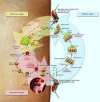Malaria: progress, perils, and prospects for eradication
- PMID: 18382739
- PMCID: PMC2276780
- DOI: 10.1172/JCI33996
Malaria: progress, perils, and prospects for eradication
Abstract
There are still approximately 500 million cases of malaria and 1 million deaths from malaria each year. Yet recently, malaria incidence has been dramatically reduced in some parts of Africa by increasing deployment of anti-mosquito measures and new artemisinin-containing treatments, prompting renewed calls for global eradication. However, treatment and mosquito control currently depend on too few compounds and thus are vulnerable to the emergence of compound-resistant parasites and mosquitoes. As discussed in this Review, new drugs, vaccines, and insecticides, as well as improved surveillance methods, are research priorities. Insights into parasite biology, human immunity, and vector behavior will guide efforts to translate parasite and mosquito genome sequences into novel interventions.
Figures


References
-
- WHO. . Making a difference. The World Health Report 1999. Health Millions. 1999;25:3–5. - PubMed
-
- Brito I. Eradicating malaria: high hopes or a tangible goal? Health Policy at Harvard. 2001;2:61–66.
-
- Chareonviriyaphap T., Bangs M.J., Ratanatham S. Status of malaria in Thailand. Southeast Asian J. Trop. Med. Public Health. 2000;31:225–237. - PubMed
Publication types
MeSH terms
Substances
Grants and funding
LinkOut - more resources
Full Text Sources
Other Literature Sources
Medical
Research Materials

